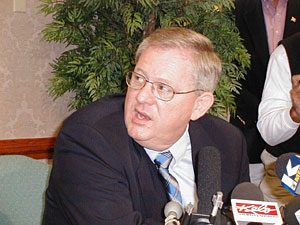|
Photos
More from MPR
Your Voice
|
What's next for Janklow, and South Dakota?
December 9, 2003
Observers say it's too soon to predict what's next in South Dakota politics. U.S. Rep. Bill Janklow resigned Monday evening after a jury convicted him of felony manslaughter for an August accident that killed a Minnesota motorcyclist. Now South Dakotans are wondering what's next for Bill Janklow, and what's next for his seat.
Sioux Falls, S.D. — Bill Janklow faces a maximum of 10 years in prison and a $10,000 fine for his second-degree manslaughter conviction. There are no minimum sentences in South Dakota, so Judge Rodney Steele could pass a sentence from the maximum down to nothing. University of South Dakota law professor Chris Hutton says Steele has many options for sentencing Janklow.
"That could include prison time; it could include time in the county jail; it could include suspension of those sentences, or a combination of some confinement and suspended confinement. I think the judge can consider something like house arrest as well," says Hutton.
Judge Steele said after the verdict that he wants a pre-sentence investigation, which will include facts on every aspect of Janklow's life -- from his driving record to his political service in South Dakota. Steele will hand down his sentence Jan. 20, 2004.
 | |||
Meanwhile, Gov. Mike Rounds has 10 days to issue a proclamation calling for a special election to fill Janklow's seat. Rounds says it'll be June 1, 2004, the same day set for primary elections. The secretary of State estimates South Dakota will save $400,000 by sharing the ballot.
Voters will be asked to decide first who will serve the remainder of Bill Janklow's term in Congress, and then who should be the party candidate for the same job on the November ballot. In essence, South Dakotans will vote on the House race three times next year.
Augustana College political science professor Brent Lerseth says the primary won't be much of an issue. He likens the June ballot to the California recall election.
"There's a short period of time where they're going to have to start thinking about the next election again. That could interfere with a few things, because presumably the person who wins a special election on June first will have the inside track of being the Republican nominee or the Democratic nominee in November," says Lerseth.
The central committees of the Republican and Democratic parties have until April to select the candidate for the June 1 vote.
Stephanie Herseth has already said she wants the nod by the Democrats. Herseth challenged Janklow in the 2002 election, and ran a closer race than some had expected.
 | |||
The Republicans are waiting on former Rep. John Thune to decide if he wants his old seat back in the House, or if he'll challenge Democratic leader Tom Daschle for the Senate. Thune challenged Sen. Tim Johnson last year and lost by 300 votes. Many expect candidates to announce their intentions after Jan. 1.
In the meantime, South Dakota will be without a vote in the U.S. House of Representatives until June. Political observers say Janklow won't be allowed to vote, even though his resignation isn't effective until Jan. 20, 2004.
Political scientist Bill Richardson of the University of South Dakota says normally one vote out of 435 in the House won't make that much of a difference -- especially if that one vote is a first-term congressman. But he says South Dakotan's sent Bill Janklow to Congress because of his personal friendship with President Bush. Richardson says Janklow is not your ordinary freshman congressman.
"That's tough to measure because it happens behind the scenes. It's not like the recorded votes in the subcommittee or committee or on the floor," says Richardson. "The degree of influence he may or may not have been able to wield would have been through the back channel personal relationships, where he might have been able to get things approved -- or at least get favorable consideration of things in the state -- that otherwise an ordinary Republican freshman would have been a back bencher."
Meanwhile, Janklow's office staff continues to work. In a written statement, Janklow's field director Dave Volk says offices in Aberdeen, Rapid City, Sioux Falls and Washington D.C. remain open. Volk wrote the 12 employees in Janklow's offices continue to conduct interviews for military service academies, help constituents solve their problems and push legislation in Congress.
Senate Democratic Majority Leader Tom Daschle praised Bill Janklow Tuesday for his service as governor and congressman. Speaking with reporters in Washington, Daschle said a person should be remembered not for the last thing they do, but for the best thing they do. Daschle testified briefly at Janklow's trial. Asked about the guilty verdict, Daschle said the jury's decision should be respected.
|
News Headlines
|
Related Subjects
|

